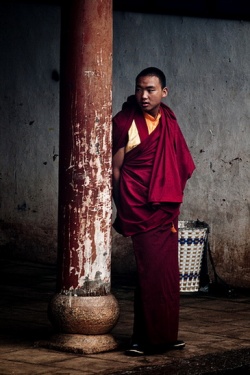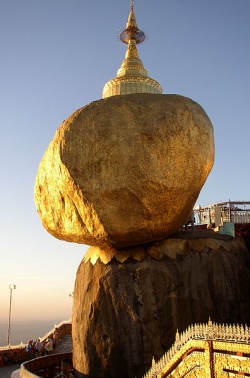Dzogchen Without Buddhism?
Posted by Malcolm Smith
The other day I saw a workshop advertised called "Dzogchen without Buddhism". I have, over the years seen a number of suggestions that Dzogchen practitioners can dispense with Buddhism, or that it is not essential to be a Buddhist to practice Dzogchen. I would like a spend a little time examining that claim.
The first question I am led to ask is this: just what is a Buddhist? At the most basic level a Buddhist is someone who believes in the awakening of a fellow named Gautama (the son of a petty tribal chief of the Śākya clan on northern plains of India, also known as "The Buddha"), and wishes to follow that path.
This leads to our next question: do Dzogchen texts mention the Buddha? It would seem, from textual evidence, that they do. Disparate Dzogchen tantras such as the rang 'byung chen po rgyud, the rig pa rang shar and the kun byed rgyal po mention a person called Teacher Śākyamuni.
I suppose this is not completely convincing evidence, since it can be pointed out that merely mentioning the name Buddha does not make a tradition Buddhist. After all, Manichaeism, Baha'i and Hinduism accord recognition to the Buddha as a great teacher of humankind. So there must be something a bit more.
How about by goal? Dzogchen, like other Buddhist traditions proposes not only is there a person called the Buddha, but that everyone who so wishes can achieve that same result, known in Buddhism as byang chub, bodhi awakening and buddha, sangs rgyas, full awakening. These two terms appear by the thousands in Dzogchen tantras and texts.
So how does Dzogchen define "buddhahood"? Dzogchen is not a gradual path, so it does not completely define full awakening in terms common to the paths of cause and result i.e. as the result of the accumulation of merit and wisdom. However, what Dzogchen does share with the lower paths of the cause and result is the definition of full awakening, buddhahood, as the permanent state of being completely free from the afflictive obscuration and being endowed with full omniscience.
Like all Buddhist paths, Dzogchen sets out to solve the questions of what constitutes suffering, the cause of suffering, and how we free ourselves from that suffering. It may be objected that the answer to that question is quite different from how it is answered in Hinayana and Mahayana, and in the lower tantras — nevertheless, the fact that it engages these questions in a Buddhist context shows that the context of Dzogchen is entirely Buddhist. In fact, there are numerous Dzogchen tantras that review the whole of the non-Buddhist and Buddhist tenet systems in ascending order from non-Buddhist materialists, Samkhya, Vedanta, and so on; then Vaibhashika, Sautrantika, Pratyekabudha, Cittamatra, Madhyamaka and so on.
Perhaps the principle difference between Dzogchen and other schools is the pairing of two states: vidyā and avidyā, rigpa and ma rigpa, knowledge and ignorance. Whereas other schools propose that affliction is the cause of suffering, and engages in scrubbing afflictions, Dzogchen sees the cause of suffering in the knowledge obscuration of avidyā, ignorance. Dzogchen suggests that ignorance can only be removed by knowledge or rigpa. That knowledge, vidyā, rigpa, is direct personal experience of our actual state. But the terms with which Dzogchen explores these issues is entirely grounded in Buddhist discourse, among Buddhists.
What about Dzogchen in Bon? This is a highly contentious issue. There may or may not have been a teacher called Ston pa Shenrab. He may have come from Western Tibet, from the vicinity of Kailash, or "Tajik" to the west. He may have lived eighteen thousand years ago, or he may have lived four thousand years ago, and so on. We have no reliable documents about him as a person that date before the 10th century. This shows however that there is a tradition about him that predates this period. But we can't really know how old it is. Everything we know about him dates from the tenth century onward. Tibetans scrubbed their own history pretty thoroughly after the imperial period, so all we have left are visionary accounts from tenth century onward.
In the end, Bon more closely resembles Buddhism than it differs from it. So my point remains the same.
Finally in terms of the path: Chogyal Namkhai Norbu Rinpoche has clearly enunciated many times the following point: there are three sacred principles without which a given practice that one is doing is not Dzogchen: these principles are going for refuge, developing bodhicitta motivation, and dedicating merits. Going for refuge is not defined by reciting some words; it is defined by the recognition of problems with one's own understanding and knowledge, and a desire to find the solution to these problems in Buddhas, such as Samantabhadra, Vajrasattva, Śākyamuni, Garab Dorje and so on, their teachings, the Dzogchen teachings, which include the meaning of all yānas; and the Sangha of Dzogchen, the vidyādharas such as Śrī Siṅgha, Padmasambhava and so on and bodhisattvas such as Mañjuśrī, Avalokiteśvara and Vajrapani.
Motivation does not mean mouthing words about saving all sentient beings, here it means that it is not sufficient to merely seeks one's own liberation, whether through Dzogchen or any other vehicle, one must have compassion and loving kindness as one's basis for entering practice.
Dedication here means that we dedicate all our practice to others, in the usual Mahāyāna way, not necessarily with words, but with our intention, so that all others will reach the state of the adibuddha, Samantabhadra, quickly.
Without these, whatever practice we are doing cannot be considered Dzogchen practice let alone Buddhist.
Dzogchen without Buddhism therefore is "Ati Lite™". It may sound good, it may look good, it might have a nice package, but in the end, it has no value. It is not spiritually nourishing, it is spiritually depleting.
Ati Lite™ will have the exact opposite effect of Dzogchen: instead of becoming a more open, more humble person, one will become more self-involved and afflicted. Instead of developing a broader mind, free and flexible, able to accommodate changing conditions, one will become more and more constricted, selfish and narrow. And in the end, one will have nothing worth giving to anyone.



